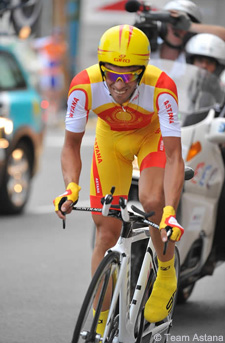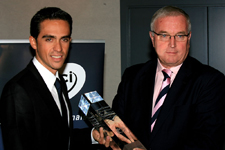 Italian directeur sportif Giuseppe Martinelli, who guided Marco Pantani to his victories in the 1998 Giro d’Italia and Tour de France, has spoken glowingly of Astana team leader Alberto Contador, with whom he will work in 2010.
Italian directeur sportif Giuseppe Martinelli, who guided Marco Pantani to his victories in the 1998 Giro d’Italia and Tour de France, has spoken glowingly of Astana team leader Alberto Contador, with whom he will work in 2010.
Martinelli praises the Spaniard’s ability to learn and his humility, and vows that the team will be 100 percent committed to helping him win his third Tour de France.
“The Astana of last year was, without doubt, stronger, but, when a team is with you 100% and you’ve got good legs, you can go very far,” he said on Contador’s official website.
“The team (Vinokourov, Pereiro, Tiralongo, Zeits…) is going to function this year, they’ll do whatever it takes. With Alberto it will be much easier, anyway, than with Pantani in 1998, when we had a really great team, but Marco only liked to ride at the back of the pack. And so the whole team had to do that, surrounding him. They [Astana] will also all be with Alberto, but ahead, at the front of the pack,” he vowed.
“All champions are special,” Martinelli continued. “His head is a bottomless well. He marches to a different drummer than normal people like us. Contador is one of these, but he has his head screwed on right. At 27, he has won a lot and can win much more.”
The Italian came on board after the reshuffling of the team. Following last year’s Tour de France, which Contador dominated, his rival Lance Armstrong and the Texan’s long-time team manager Johan Bruyneel announced that they were going to move to the new RadioShack squad.
Riders loyal to Armstrong also jumped ship, as did others who might have stayed with Contador had he known where he would be racing in 2010 and been able to offer them contracts.
2006 Tour de France winner Pereiro and former Vuelta a España victor Vinokourov are the biggest names who will ride in support of the team leader, but there are others who should also perform well.
Martinell’s role is to make sure everything runs as smoothly as possible once the races start. He confesses that the thoughts of this are a little intimidating, given that the stakes will be so high this season.
“Directing him will be an adventure, the zenith for a directeur sportif. A huge responsibility,” he said. “The concern that something goes wrong, that Alberto doesn’t fulfill his potential because of an error of mine, because of bad directing…that’s the danger.”
Impressed with character:
Martinelli spent a long, long time working with Pantani and while he undoubtedly has good memories of his time directing the late climber, he appears to be more impressed with Contador’s character.
 Pantani had a reputation of being aloof, distant; he said that the Spaniard is exactly the opposite. “What I like about Alberto is his humility. He’s a person that likes to speak and to listen. He has confidence in me or, at least, he doesn’t make me feel inferior when I talk to him. He looks me in the eye,” he said. “When I spoke with Marco, on the other hand, often I didn’t know if he was listening to me or not.
Pantani had a reputation of being aloof, distant; he said that the Spaniard is exactly the opposite. “What I like about Alberto is his humility. He’s a person that likes to speak and to listen. He has confidence in me or, at least, he doesn’t make me feel inferior when I talk to him. He looks me in the eye,” he said. “When I spoke with Marco, on the other hand, often I didn’t know if he was listening to me or not.
“Alberto, when he’s listening, is listening. He’s a champion with humility and, from there, from humility, he wants to create his character, which is difficult when they [the public] place you at the highest level, on a pedestal.”
Two physiologists who have worked with him also report special characteristics, with Íñigo Millán testifying as to his ability to push himself, and his coach Pepe Martí stating that he has a phenominal self-awareness that revealed itself during last year’s Tour.
Millán conducted physical tests when both he and Contador were with Once in 2003, and saw something unusual then.
“He was just a kid, but he was the one that got farthest in the exercise stress tests,” the current Garmin trainer said of the-then 20 year old. “He suffered and suffered, but didn’t stop. He stood up on the bike from the beginning and I thought that he’d stop it right away, but he kept it up.
“That’s why when I saw him win the Tour, the Verbier stage, without showing signs of suffering—and I know how he is when he’s suffering because I’ve seen him suffer—I said to myself ‘Alberto’s going to take a lot of time.’”
Martí points to the rider’s victory in the final time trial of last year’s Tour as evidence that he has a strong estimate of both his and others’ abilities.
“Every year that goes by, he knows himself better. He knows how to manage the information that he gets very well, how to self-regulate,” he said. “For example, in the time trial at Annecy, in the Tour, he had calculated that in order to beat Cancellara – bearing in mind what he experienced at Beijing and Monaco – he would have to crest the top of the hill [the 3rd time check] with 46 seconds’ advantage over the Swiss. He told me before the start: ‘If I pass through with 46 seconds, I win.’ He did it with exactly 46 seconds, and won by three seconds.”